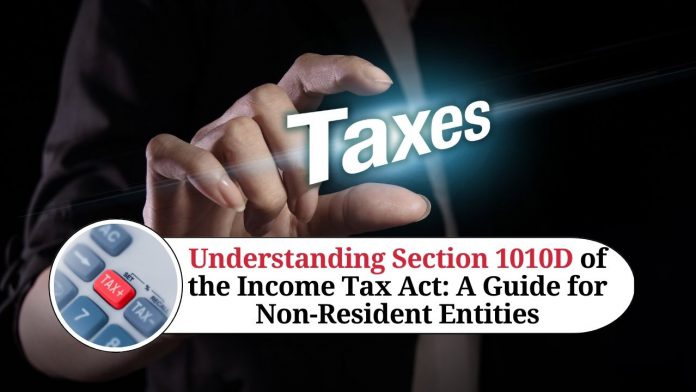Section 1010D of the Income Tax Act is an important provision that deals with the taxation of income earned by foreign companies or entities in India. This provision applies to non-resident entities that earn income from India, either through a business connection in India or by way of any other source of income.
Basic Principle Of Underlying Section 1010D
The basic principle underlying Section 1010D is that all income earned by a non-resident entity from India is subject to tax in India unless specifically exempted under the provisions of the Income Tax Act or any other relevant tax treaty. This means that any income earned by a foreign company or entity in India, whether in the form of profits, royalties, interest or any other form of income, is taxable in India.
However, the tax liability of a non-resident entity in India is subject to certain conditions and exemptions. For example, a non-resident entity is exempt from tax in India if it does not have a permanent establishment in India, and the income earned by it is not effectively connected to such a permanent establishment.
Similarly, if the non-resident entity is a resident of a country with which India has a tax treaty, the provisions of the tax treaty may override the provisions of Section 1010D, and the tax liability of the non-resident entity may be determined by the tax treaty.
Another important aspect of Section 1010D is the requirement of withholding tax. Under this provision, any person responsible for making a payment to a non-resident entity is required to deduct tax at source from such payment, and remit the same to the Indian government. The rate of withholding tax may vary depending on the nature of the payment and the tax treaty, if any, between India and the country of residence of the non-resident entity.
Final Conclusion
In conclusion, Section 1010D of the Income Tax Act is a crucial provision that governs the taxation of income earned by non-resident entities in InForeign companies and entities need to understand stand the provisions of this section and comply with the tax obligations as required by law. Failure to comply with these obligations may lead to penalties and legal consequences.
Read more useful content:
- section 145 of income tax act
- section 10e of income tax act
- section 9 of the income tax act
- section 94b of income tax act
- section 206aa of income tax act
Here are some frequently asked questions (FAQs) related to Section 1010D of the Income Tax Act:
Q: What is Section 1010D of the Income Tax Act?
A: Section 1010D of the Income Tax Act is a provision that deals with the taxation of income earned by non-resident entities in India.
Q: Who is considered a non-resident entity under Section 1010D?
A: A non-resident entities of this section, is an entity that is not resident in India.
Q: What is the tax liability of a non-resident entity under Section 1010D?
A: All income earned by a non-resident entity from India is subject to tax in India unless specifically exempted under the provisions of the Income Tax Act or any relevant tax treaty.
Q: What is a business connection in India?
A: A non-resident entity is said to have a business connection in India if it carries on business in India through a person who is its agent or if it has an office, branch, or any other place of business in India.
Q: What is withholding tax?
A: Under Section 1010D, any person responsible for making payment to a non-resident entity is required to deduct tax at source from such payment, and remit the same to the Indian government.
Q: Is a non-resident entity exempt from tax in India?
A: A non-resident entity may be exempt from tax in India if it does not have a permanent establishment in India, and the income earned by it is not effectively connected to such a permanent establishment.
Q: What is the role of tax treaties under Section 1010D?
A: If the non-resident entity is a resident of a country with which India has a tax treaty, the provisions of the tax treaty may override the provisions of Section 1010D, and the tax liability of the non-resident entity may be determined by the tax treaty.
Q: What are the consequences of non-compliance with Section 1010D?
A: Failure to comply with the tax obligations under Section 1010D may lead to penalties and legal consequences.




















